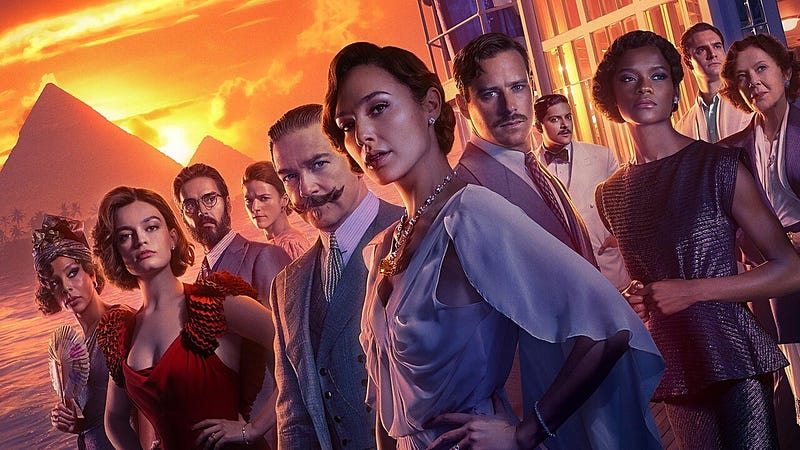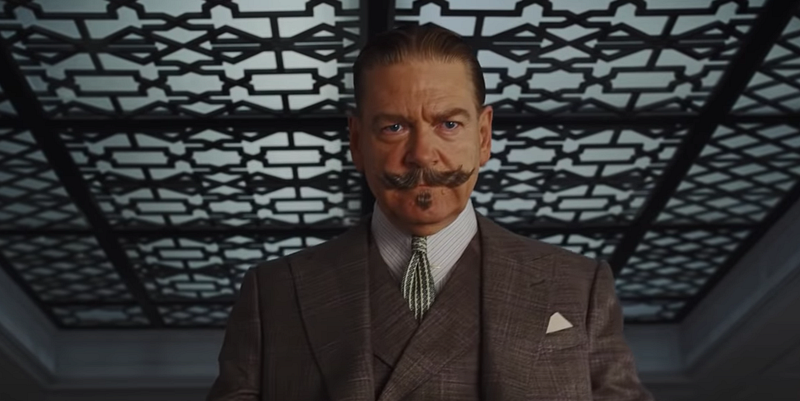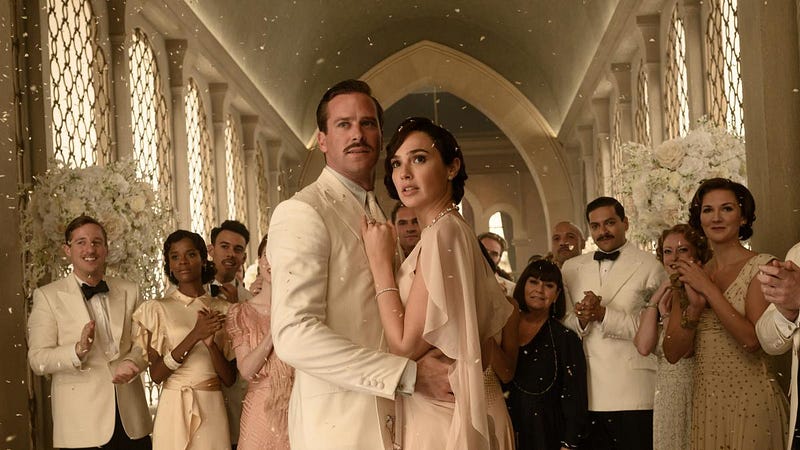Branagh returns to the roles of Hercule Poirot and director, for his second Agatha Christie adaptation

There are few films as plagued by the pandemic as Death on the Nile. Enduring several release delays, not to mention a rather bumpy PR issue for several of its stars, Kenneth Branagh’s return to Agatha Christie’s works is finally hitting theaters. Another spin as director, after 2017’s Murder on the Orient Express, and as star, sticking on that famous mustache again as Hercule Poirot. Like it’s predecessor, Death on the Nile adheres closely to Christie’s original work, has plenty of polish, and a sprinkling of stardust thanks to a recognizable cast, but suffers some of the same missteps that cause it to fall short.
Events unfold in 1940s Egypt, with Poirot on sabbatical in the region. He gets swept up in the celebration and drama surrounding the wedding celebrations of wealthy heiress Linnet Ridgeway-Doyle (Gal Gadot), and the not wealthy, but quite handsome, Simon Doyle (Armie Hammer). Joining them at their sumptuous hotel in the company of Linnet’s inner circle of family and friends. Linnet’s former suitor Dr Linus Windlesham (Russell Brand), her cousin (and business manager) Andrew (Ali Fazal), maid Louise Bourget (Rose Leslie), godmother (Jennifer Saunders), with her nurse Mrs Bowers (Dawn French) in tow. Also on board are Poirot’s old friend Bouc (Tom Bateman, returning from his role in Murder on the Orient Express) along with his mother Euphemia (Annette Bening). Filling out the party is blues singer Salome Otterbourne (Sophie Okenodo) and her her manager/niece Rosalie (Letitia Wright), an old schoolfriend of Linnet’s. Spoiling the good time is the arrival of Jacqueline de Bellefort (Sex Education’s Emma Mackey), Linnet’s former best friend, and Simon’s former fiancee. Fueled by anger for the betrayal of the pair, she has been stalking them across the globe since her own engagement was torn apart. Concerned about their safety, the newlyweds decide on a change of venue, hiring a steamboat, the S.S. Karnak, and chugging off down the Nile. It’s not long before Jacqueline finds her way on board. Cue one murder, and Poirot gets to work, uncovering motive and intrigue within this social circle, as he tries to solve the case.

The “whodunnit” has long captured our imagination, with Agatha Christie deftly mining this genre to ensure her legacy as the world’s best selling novelist. Since Branagh’s Murder on the Orient Express, we were treated to Rian Johnson’s superb Knives Out, and more recently several small screen comedies, notably Steve Martin’s Murders in the Building and the Will Arnett vehicle Murderville. Satiating our bloodlust, offering procedural aspects, and the quintessential shifting landscape as characters spar and stress under suspicion. This enduring appeal gives Death on the Nile something of an innate appeal, and disappointingly, little else.
Screenwriter Michael Green keeps the tale generally true to Christie’s original vision, while adding some much needed diversity to the lineup. His only real addition to the tale is a prologue that while meant to impart some emotional gravitas to the film, instead just serves as a brooding origin story for facial hair. Overall the film doesn’t look to reinvent the wheel, instead settling for a generally fine, if often rickety ride. An assembly of suspects, each financially connected (or indebted) to Linnet, a step by step interrogation of the suspects, a little drama en route, and a final confrontation with the survivors. There is a lack of pace, misdirection and complexity, with a relatively inert climax. Instead of the chicanery that drove Murder on the Orient Express, Death on the Nile is more emotionally driven, primarily in matters of love. Forbidden love, unrequited love, obsession, lust, and everything in between. Not just woven into the connective strands between the passengers of the Karnack, but also into a fleshing out of Poirot’s character. Despite this, the film feels a little staid and shallow, failing to take advantage of some more juicy moments or character traits.
Aesthetically, the film lacks the sumptuousness of Murder on the Orient Express, horribly drab CGI evident, notably in building the Egyptian landscapes. The classic nature of the film cries for a tangibility that is frequently lacking. Some color is found amongst the performances. Branagh’s turn as Poirot has a undeniable charm, even if it is a little more dour this time out. Russell Brand impresses as a quietly-spoken ex of Linnet’s, somehow managing to better sell heartbreak than Branagh. Letitia Wright’s performance shows some teeth and frankly, it’s always a delight to see French and Saunders reunited. But the real standout is Okenodo, who infuses her performance with sass and soul. A smattering of sparkle throughout the film, but not enough to truly elevate Death on the Nile. Leaving us with a slice of old-fashioned entertainment, one that just isn’t quite satisfying enough for modern appetites.

Death on the Nile hits theaters on February 11th, 2022




